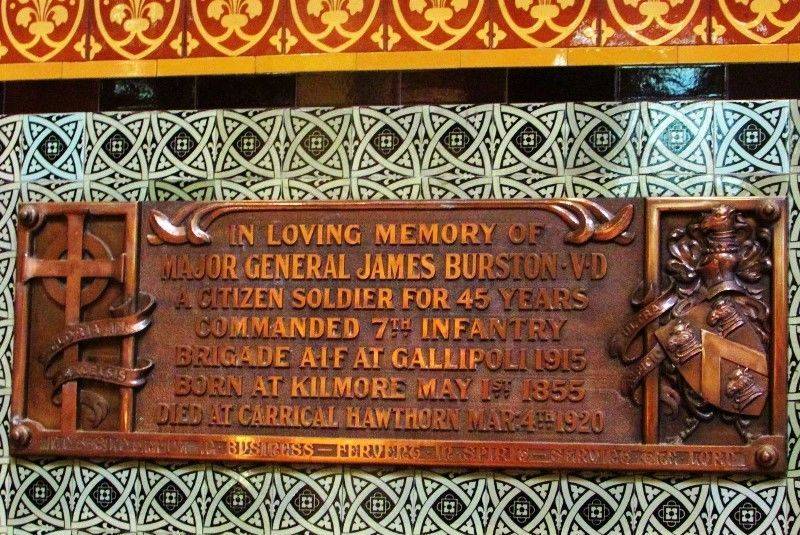
Major General James BurstonPrint Page 

The plaque commemorates Major General James Burston, Commander of the 7th Infantry Brigade at Gallipoli during World War One, and a businessman in Victoria. Major General Burston was a former Lord Mayor of Melbourne.
His father, Samuel Burston, bought the maltings of J. Gough & Sons in Flinders Street, trading as Samuel Burston & Co. Although he had no previous experience as a maltster, he became one of the leading innovators in the trade. After a visit to Europe, in the early 1880s he rebuilt the Flinders Street Malthouse, using the new Saladin or pneumatic process for making malt. The product proved a success and he was soon exporting it to all the colonies.
James joined the business at 14. In the years preceding his father's death in 1886 he ran the business with his younger brother George William (1859-1924). It became a limited liability company in 1890, with James as managing director. After a disastrous fire the factory was rebuilt in 1892. Later the firm took over the maltings of the Victoria Brewery Co. and in 1912 merged with Barrett Bros, its chief competitor, to form Barrett Bros & Burston Co. Pty Ltd with James as one of its four original directors. Samuel Burston & Co. Ltd remained separate.
James Burston's chief interest outside the business was the Victorian Volunteers. He joined as a private in 1873, was commissioned lieutenant in 1879, and promoted captain in the 2nd Infantry Battalion in 1885, major in 1889 and lieutenant-colonel in 1895. Burston's battalion won the Brassey marching and firing competition four times, and in 1897 he represented Victoria at the Diamond Jubilee celebrations in London. While in England he attended a course at Aldershot at his own expense. In 1908 he was appointed staff officer to the officer commanding the Victoria Field Force.
In 1900 he was elected unopposed to the Melbourne City Council, serving as lord mayor in 1908-09 and 1909-10. His concerns were the city finances, the beautification of the Yarra and the public gardens, the problem of dusty streets, and the memorial to King Edward VII. He retired from the council in 1912.
When World War One broke out Burston, who had twice been on the unattached list and was now 58, resumed active duty and was made chairman of the Officers' Selection Committee, September 1914 to April 1915. He was then appointed to the Australian Imperial Force to command the 7th Infantry Brigade, which embarked on 2 June 1915 and arrived at Port Said on 30 June. He reached Gallipoli in September where the brigade was stationed at Chalac Dere and the Apex. Despite his determined efforts the physical conditions proved too much for his health and at the end of October he was appointed officer-in-charge of reinforcements at Mudros, commanding 15,000 men at an inspection by Lord Kitchener. In February 1916 Burston went to London on special leave before returning to Australia where he was promoted honorary brigadier general and placed on the reserve of officers in September. He retired in January 1920 with the honorary rank of major general.
Burston was president of the Melbourne Permanent Building Society and vice-president of the Universal Permanent Building and Investment Society, which were later amalgamated through his efforts. He was for some years chairman of the Bank of Victoria.
.
Location
| Address: | Flinders & Swanston Streets, St Paul`s Anglican Cathedral, Melbourne, 3000 |
|---|---|
| State: | VIC |
| Area: | AUS |
| GPS Coordinates: | Lat: -37.817146 Long: 144.967869 Note: GPS Coordinates are approximate. |
Details
| Monument Type: | Plaque |
|---|---|
| Monument Theme: | People |
| Sub-Theme: | Community |
| Link: | http://adb.anu.edu.au/ |
Dedication
In Loving Memory Of Major-General James Burston V D
A Citizen Soldier For 45 Years
Commanded 7th Infantry Brigade A.I.F. at Gallipoli 1915
Born At Kilmore May 1st 1855
Died at Carrical Hawthorn Mar. 4th 1920



